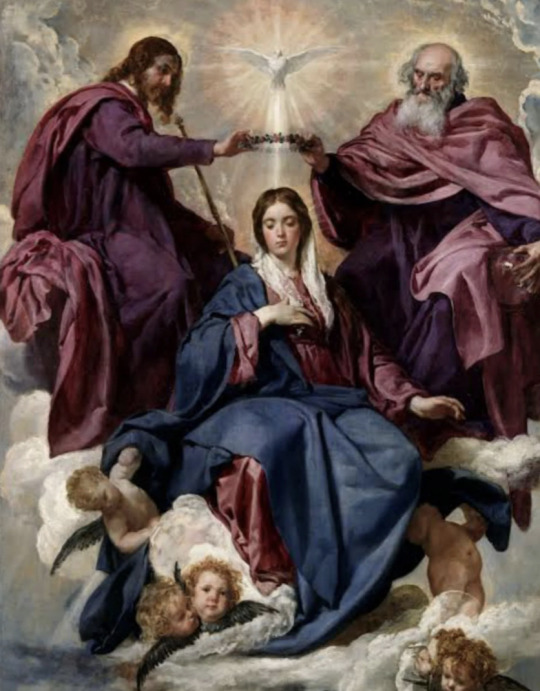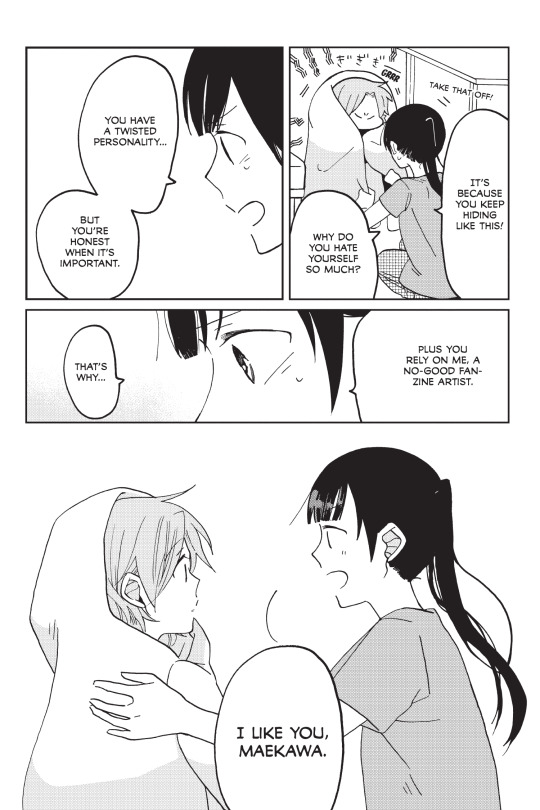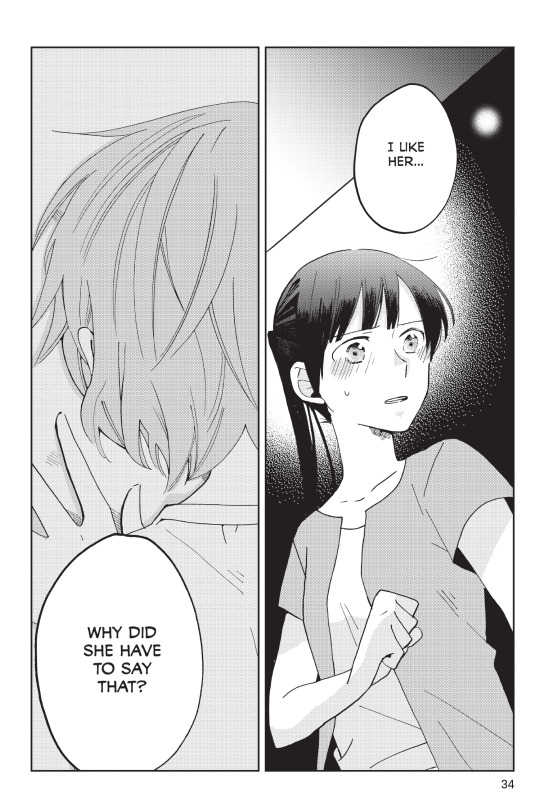#i love it when manga artists openly reference their inspirations in their art like this
Text
im not sure if this is surface level knowledge when it comes to being a hxh fan but one of my online friends pointed out in a post the fact that most of the hunterxhunter volume covers for the manga were based off of renaissance/religious paintings and this can also apply to the general design of the phantom troupe (the symbol of chrollos outfit/shizukus necklace being the cross inverted backwards) and i thought it was an interesting concept to make out of it


#text#hxh#hunter x hunter#phantom troupe#i just think its really cool in my opinion#i love it when manga artists openly reference their inspirations in their art like this#hellz's random ass thoughts
9 notes
·
View notes
Text
LGBTQ Manga Review - Still Sick Vol. 2

Still Sick Vol. 1 was a highlight for me last year. I immediate fell in love with the complex characters and storytelling and, based on the first volume, I believe that Akashi has created one of the best shakaijin Yuri (Yuri works featuring romance between adult women, often in the workplace) out there. The series took a very typical office romance story and infused it with several unique elements, like a very meta understanding and portrayal of Yuri and Yurijin. On top of all that, Akashi demonstrated an apparent willingness to tell emotionally varied and impactful stories with subtlety, a trait often missing from more ham-handed Yuri melodramas. We, as an audience, could grow in our understanding of the characters, their backgrounds, and their neuroticism rather than have it all apparent for us. The second volume has done little but confirm to me that my initial reactions were right on the money. With Still Sick Vol. 2, Akashi delivers a stunning continuation to one of last year's best releases.

Still Sick Vol. 2 takes up directly where the first book left off, with Maekawa suddenly and somewhat cruelly kissing her friends and coworker Shimizu. The kiss was initially intended as a joke; however, it further confuses Shimizu as she struggles to comprehend her own sexuality and wishes to support Maekawa's efforts to reignite her former career in manga. Her conflicted feelings come to a head when, in a comfortable moment, she suddenly and accidentally reveals that she likes Maekawa. The following regret and discomfort are alarming human and relatable, as Akashi really captures the essence of a flustered lesbian. This confession acts as the catalyst for the dramatic transformation both characters begin to undergo as the story continues.

As in the first book, Maekawa is an irresistibly capricious and complex character. She acts exceptionally clingy around Shimizu in some moments, but in others, pushes her away. One of the best aspects of her character is that, just like the first book, each of her actions is not outright explained, nor are they random, but rather the appropriate reactions based on her somewhat twisted sense of self and the world. The more one reads into it, the more her varied, occasionally upsetting acts appear like those of a woman struggling to figure out what she wants out of life and out of her relationship with Shimizu. Early in the story, she and the reader have an epiphany that she wants to be loved. Still, throughout the story, her actions hammer home how alien and disconcerting the topic affection, romantic or otherwise, is for her.

One of the central conflicts revolves around Maekawa's manga, or rather, her writing the manga. Just as the first volume dived into the meta of the Yuri genre and its fanbase, this book details some of the struggles creators to feel when working on a project. For example, Maekawa makes multiple references to the balance artists, especially those working with publishers, must maintain between their inspiration and desires and their audience’s interests. She shows frustration with her work and sufferers from bouts of self-doubt and sadness when she hits blocks. It is all very realistic, and the reader gets a sense of the nuanced difficulties professional artists face.
The two plotlines, Maekawa's struggle to complete her manga and Shimizu navigating her feelings for her, are well integrated and support each other. If either element were absent, the other would have to be utterly changed, showing Akashi's storytelling ability. Shimizu's apparent greatest desire is to be there for Maekawa and support her work as a mangaka. However, through this support and want to be present, Shimizu has many of her more vulnerable moments, seeking to inspire her friend, which eventually leads to her confessing her feelings. On Maekawa's part, her work affects her character first and relationship second, the opposite of Shimizu, making for a nice contrast and more development for the often-flighty woman. The realization she has early in the story creates a conflict within her, expressed through her work and relation with Shimizu.

There is a constant push and pull between Shimizu and Maekawa, with each character taking it in turns to accept or reject the other. On Shimizu's part, this dynamic looks like her being there for Maekawa and enthusiastically supporting her artwork or avoiding her and using work as an excuse to back off. Maekawa, however, true to her character, is much more extreme in her actions, acting overly affectionate to Shimizu at times and openly hostile in others. The oscillating relationship continues as they both come to terms with their feelings, both romantically and around Maekawa's manga.
Akashi excels at justifying the varying actions of their characters while maintaining a sense of discovery and suspense for the reader. Only through deep and thoughtful readings can we hope to understand every action, but all the clues are there, making for an excellent repeat read and keeping the book in the audience's minds long after they put it down. However, sometimes, even having uncovered the reasons behind them, Maekawa can seem overly cruel and dramatic. It does not detract much from the overall work, but a few chapters hold a teetering balance just above falling into melodrama.
There is not much to say about the artwork that I did not mention in my review of the first volume. The character designs remain solid and consistent. However, the annoying lack of detail is even more apparent than in the first book. Panels often have a dull, empty feeling or fail to communicate the powerful writing's emotional tone. They are not bad, as previously said, they are consistent and keep the reader engrossed, but it is aggressively average.

One aspect of the art I will praise is its lack of service. Akashi treats their character and story with respect, and there is not even so much as a cleavage shot anywhere. The few moments which could contain sexual content, like when Maekawa embraces Shimizu and approaches for a kiss, are used much more for tension than service. It is perhaps the one area where the art begins to excel. The framing and expressions are all very carefully chosen to maintain the proper tone and avoid exploiting the characters. The best example of this is easily the onsen. At the height of their reluctant animosity at a company trip, Maekawa and Shimizu have to navigate being naked at the onsen together. The moment contains no sexual content but is excellently presented as an awkward experience to enhance tension, followed by some light comedy that brings the two women closer together.

Still Sick continues to amaze in its second volume. The tensions and stakes are much higher now, and the dramatic yet grounded relationship will enthrall readers as it develops. The Yuri romance integrates beautifully with a wonderful and incredibly meta plot about creating manga and all the turmoil the come with both. Akashi crafts a sophisticated and mature story that never lets up with twists and steadily progresses forward at a satisfying rate. This series is easily one the best shakaijin works out there and deserves hefty praise and enthusiastic investment from all its readers.
Ratings:
Story – 10
Characters – 9
Art – 5
LGBTQ – 7
Sexual Content – 0
Final – 8
Purchase a copy of Still Sick Vol. 2 digitally or in print - https://amzn.to/2ZrErgn
Purchasing manga legally helps support artists and publishers
Review copy provided by Tokyopop
Support Yuri and LGBTQ news and review on the YuriMother Patreon
#reviews#lgbt#yuri#manga#lgbtq#still sick#lgbtq+#queer#gay#wlw#girls love#gl#lesbian#lesbians#romance#anime#art#comics
567 notes
·
View notes
Note
Yusuke's childhood!
♔ send me a topic to write meta about my muse on.— yusuke’s childhood; past times that he cannot wrap his head around, now.
while the memories may be vague, yusuke associates his childhood with loneliness. always a withdrawn child, he found it difficult to connect to other children in his elementary school class. however, his aloof behavior wasn’t exactly inherent to his personality. he was always very enthusiastic about topics pertaining to art, and he enjoyed playing with toys and reading manga. however, madarame raised him on a strict philosophy - the ever-present, ever-toxic mantra that children should be seen and not heard. while yusuke would grow up and give in to some of his natural quirks, that was largely due to the influence of the other pupils that eventually moved in to madarame’s house. in fact, he only started opening up once the first pupils started enrolling under madarame’s tutelage.
related to this - madarame did not buy yusuke toys or volumes of manga, stating that they were useless items and a waste of his ‘limited’ money. the only goods that madarame purchased for yusuke were related to art in some way - brushes, paper, inks, pencils, paints. yusuke had to share these with other pupils, but that didn’t bother him, and the other pupils were always very kind to the small, thin child under madarame’s care. the manga that yusuke hid in between pages of art reference books were given to him by the other pupils, too. even as a high school student, yusuke cherishes these volumes of manga. in terms of necessities, madarame bought very cheap foods for his students, such as bread, rice and fish. this food was rationed strictly, which led other pupils to sneak food in from the outside or to buy their own food. yusuke didn’t have money to do so, and was afraid that he’d get in trouble with madarame if he allowed himself to get treated to extra food. he still gave in very often out of hunger, but madarame’s ‘anti-gluttony’ philosophy became ingrained in his mind. he’d feel very guilty whenever he gave in to eating extra food. of course, madarame showed concern over yusuke at times. whenever yusuke was ill, madarame would be sure to purchase medicine for him. he’d even take the child to the doctor if things grew dire. however, yusuke grew up to understand that these are behaviors expected of one’s guardian - they’re not things to be praised. the true extent of madarame’s cruelty was always hidden beneath a kind smile, for yusuke. and yusuke still blames himself for defending him. in fact, he will likely never stop doing so. he revered madarame for creating the sayuri. by lying to yusuke about being sayuri’s artist, madarame put himself in such a high degree of power over yusuke. the connection he felt to the sayuri ever since he was a small child served to deepen his trust in madarame when, in reality, that was a trust - a love - that truly belonged to its real creator; namely, yusuke’s mother. at a very young age, yusuke learnt how to close himself off when pupils began openly talking about how madarame stole their ideas and emotionally abused them. he also learnt how to tune madarame out whenever he heard him yelling at other pupils who refused to let him plagiarize their work. he just didn’t want to believe in any of that. he tried not to acknowledge the overall amount of pupils lessening as time passed, but it scared him, knowing that the older pupils could be there at one moment then completely vanish at the next. yusuke knew conflict was happening all around him, and he knew that he’d be pulled into it eventually. when he was, he was a middle school student with unparalleled artistic ability. madarame took credit for this, of course - and yusuke didn’t protest. he willingly handed his ideas and works over to madarame, convincing himself that the fear he felt for madarame was actually awe, and that the deal between them was different from the deals he made with other pupils. he convinced himself that it was entirely consensual. it was a very delicate lie he crafted - one which served to keep him under the house’s roof, rather than in an orphanage or on the streets. his logic was that his agreement to be mistreated meant that he was not being mistreated. yusuke’s main coping mechanism during these times was his own imagination. he’d shut out reality and get lost in his own world of fantasy - inspired by art, especially the sayuri. by engrossing himself in his artwork and honing his own craft, yusuke gave himself relief from the stress and pressure that reality presented him with. art was his home and grew to be his only respite. when rumors that one pupil who got kicked out of the house killed himself began circulating around the house, yusuke had his first major ‘i need to get out of here’ moment. he had a full-fledged breakdown that night, alone in his room. that was the moment that he realized that something was truly wrong. the pupils who remained in the house at that time were all extremely secretive. repeated conflicts meant that the sense of camaraderie that existed when yusuke was young gave way for a very ‘everyone for themselves’ sort of vibe. yusuke’s previously unshakable denial - all the ‘deals’ he made with his own conscience - finally began to crack. at this point, yusuke entered high school, and the year before he met the phantom thieves was very mentally tumultuous for him. it was during this time that the remaining pupils left madarame’s home, leaving yusuke as madarame’s lone disciple. it was also during this time that yusuke actually admitted that he was being mistreated to another former student - natsuhiko - but also believed that he could not escape his situation. while his hesitance to stay with madarame became more evident, his defensiveness of madarame also skyrocketed in regards to how he approached outsiders who wanted to help him out of his situation. by his second year of high school, yusuke is fully defensive of madarame when the phantom thieves first approach him. this seems paradoxical, maybe, but the reason for this defensiveness is because he is entirely aware that madarame is guilty for doing incredibly horrible things. when you know that accusations you once vehemently went out of your way to disprove as correct, you always, always have a hyper-defensive reaction to them. after his awakening, yusuke openly stated that madarame was a master of psychological trickery and it’s extremely important to acknowledge how dangerous this particular brand of abuse can be.
with yusuke’s awakening, he finally begins to openly discredit the lies that madarame fed him all his life. while he may still struggle with the philosophies and behaviors that he learnt as a child, yusuke grows to be more and more honest with himself over time, and it’s amazing to see him conquer the challenges that have been looming over him since he was a very small child.
#♔#(( THIS GOT SOOO LONG SORRY ))#(( it strayed from just his childhood into more like... adolescence... Still tho ))#(( hope it gives some insight into how i interpret his character! ))#abuse tw /#suicide mention tw /#survivaltrick
1 note
·
View note